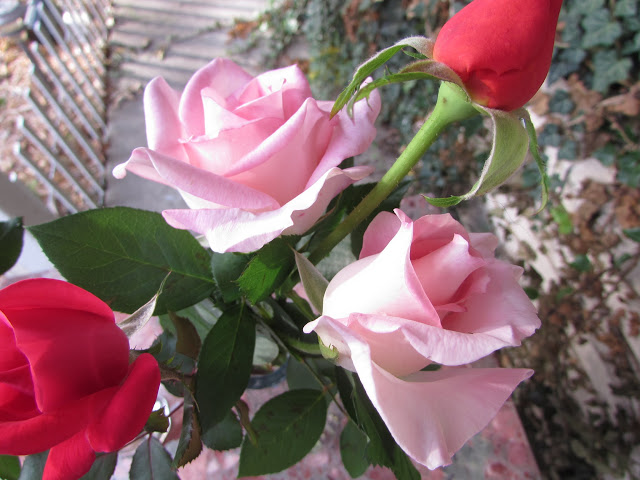Those new to growing roses should start with the older, more proven kinds. Every catalog is packed with the latest varieties, and they cost the most. Their inherent weakness are not listed - and you better buy before they run out of them!
For example, Pope Paul II is a beautiful and prolific white rose,but it is weak in the vase and does not last long. Therefore, it is ideal for creating contrast outside. In my garden, white roses and Peace roses attract aphids best. That does not bother me in the long run, because the aphids attract aphid-eaters, and the second bloom cycle is close to perfect.
I would buy three to five roses of the same variety, such as Double Delight, Fragrant Cloud, or Mr. Lincoln. That way a group of roses will be available to admire and to cut for vases at the same time. Fragrant roses were the exception a few decades back, but now the breeders are emphasizing aroma again. Most people want to smell roses first, so starting with the fragrant ones will be more satisfying. The three just mentioned are among the best performing and fragrant varieties.
Many times the name will give the scent away, as Fragrant Cloud does. Thus I am sure Bellaroma would be a good choice. I have not grown that one or many other choices.
I am now more likely to order an old favorite than the latest and best.
Long Term Investment
A bare root rose will bloom about one month from planting, which is quite a thrill. Roses used to flower once a year, so more blooms are a blessing of the modern age of hybrids.
Increased blooming takes place because of rain - not chemical fertilizers - and establishing a great root system with fungus helping out. Roots will also grow better with frequent pruning.
Some roses die, and a thorn-scarred veteran will think, "Oh so sad, now I have to try out a new one in that spot." But some roses continue and that longevity plus a good summer will yield spectacular results.
Eschew Man-Made Cures
To have the best roses, one must avoid all toxins, and that includes chemical fertilizers. OK, purists, manure is made up of chemicals too, but you know what I mean. If it has an NPK rating, put the container down. If the professional gardening writers despise it, use it -
- Manure - rabbit, cow, horse, bird - but not cat or dog
- Compost - the elements just below, rotted and mixed with soil
- Mulch - leaves, grass, chopped up clippings
- Rainwater
I have barrels of rainwater waiting for needy plants. A few large cheap trash barrels will becoming increasingly useful during the summer. If drought threatens, fill them with tap water to let the chlorine evaporate. If chlorine is good at killing bacteria, it is also good at suppressing plant growth. Good, stinky rot is great for the soil because the creatures of rot are attracted to foul smells and convert them to useful plant chemicals.
I look at piles of leaves the way some people look at the Golden Coral buffet spread. If I had the time and a good disguise, I would gather piles of crushed leaves from the street, where they are prepared perfectly for mulch. Our neighbors next door left a front yard carpeted with needles, a fact overlooked until the landlord began raking them into piles. "Just what I need for the cardboard covered lawn nearby." I will make my move today and claim them.
Crushed leaves are great because the tiny flakes are ready to rot when wet and to serve as food for earthworms. They will also suppress weeds and not blow away as eagerly as newly fallen leaves.
Leaves that survive the winter are always ready for the soil, so I gather as many as I can in this area. A lumpy green bag on the curb is my future prize if I find new gardening areas that have absorbed previous layers of leaves.
All this has been created, managed, and engineered by the Creating Word, identified clearly as the Son of God in John 1:3. Mankind has said many times over, "I have a better plan." But those plans are hopelessly flawed.
Insecticides kill beneficial insects and spiders much better than they eliminate pests. The pests always come back because toxins weaken the soil and plants.
Weed killers are especially effective on flowers and bushes, but not so much on weeds. Consider this - would the weed killer industry be doing so well if they actually worked? No - they are the equivalent of acne medicine, a profit-center for every company that can turn a few pennies of chemical into an imagined cure.
The more one seeds Creation in the garden, the more likely he will see the effectiveness of the Word in all matters.






